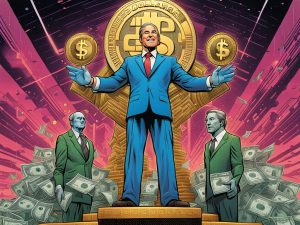Significant Legal Development for Tornado Cash: TORN Token Rises 💹
The recent court ruling has ushered in a new chapter for the cryptocurrency mixer Tornado Cash. An official decision from the United States District Court for the Western District of Texas has effectively overturned the sanctions imposed by the U.S. Treasury Department on the platform. This decision comes as a response to previous allegations regarding its involvement in facilitating money laundering activities, particularly in connection to North Korea. Following this year’s ruling, the value of the TORN token experienced a substantial surge, demonstrating the market’s optimistic outlook following this legal development.
Tornado Cash: The Background of Sanctions 🚨
In August 2022, the U.S. Treasury’s Office of Foreign Assets Control (OFAC) enacted sanctions against Tornado Cash, citing its role in supporting unlawful digital asset activity. The court’s recent overturning of these sanctions signifies a critical shift. The decision was influenced by a range of factors, including the broader implications it could have on the cryptocurrency ecosystem.
Key figures within Tornado Cash’s development team also faced serious legal repercussions. Alexey Pertsev, one of the developers, was sentenced to over five years in prison on charges related to money laundering. Furthermore, two other developers, Roman Storm and Roman Semenov, were charged in August 2023 with allegedly aiding in laundering substantial amounts, exceeding $1 billion.
Market Impact: TORN Token Sees Gains 📈
The court’s announcement had immediate effects on the cryptocurrency market, particularly for TORN, which saw a significant uptick in its value. Traders and analysts viewed the court’s decision as a positive indicator for the future of the Tornado Cash platform and the utility of its native token.
Legal Implications of Smart Contracts 🚀
One of the most noteworthy aspects of the court’s ruling is its focus on smart contracts related to Tornado Cash. The court determined that these contracts do not qualify as property under the International Emergency Economic Powers Act. This interpretation has wide-ranging implications, not only for Tornado Cash but also for the treatment of smart contract technology in general.
The Blockchain Association has stressed that technology should not be penalized as a whole based on how it is utilized. Their statement emphasized that it’s the responsibility of lawmakers to target malicious actors rather than the underlying technology itself. Such perspectives highlight the ongoing debate surrounding accountability and regulation in the digital asset space.
Responses from the Crypto Community 🤖
The ruling has sparked various reactions from the cryptocurrency community. Developers and users have taken to social media to voice their opinions on this significant judicial outcome. Many view it as a positive development that may pave the way for future innovations in decentralized software development. Roman Storm, who is facing serious legal challenges, echoed concerns about the ramifications of the charges against him, suggesting that criminalizing software development could have a chilling effect on the entire tech industry.
Responses included celebratory messages from community members, with some referring to the day as a victory for Tornado Cash. Such sentiments signify a collective sigh of relief for many who believe in the potential for decentralized technologies.
Hot Take: Navigating the Future of Crypto Regulation ⚖️
The reversal of sanctions against Tornado Cash represents a pivotal moment in the ongoing discourse regarding crypto regulation and the status of decentralized platforms. The implications of this ruling extend beyond just Tornado Cash; they set a precedent for how future cases might be adjudicated. As technology continues to evolve, striking a balance between regulation and innovation will be crucial for fostering a sustainable cryptocurrency ecosystem.
In conclusion, as the cryptocurrency landscape continues to develop, it is essential to monitor changes and legal decisions that impact this space, as they will undoubtedly shape the future trajectory of digital assets, decentralization, and the underlying technology that supports them.





 By
By
 By
By
 By
By

 By
By
 By
By